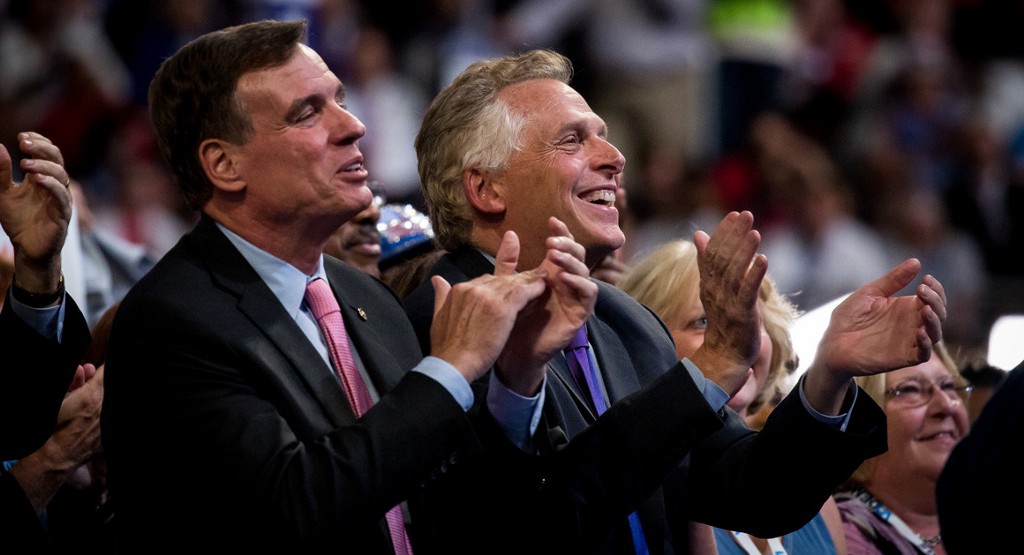Virginia entrepreneurs have a new, one-stop-shop to access capital needed to start and grow their businesses.
Virginia is for Entrepreneurs, announced today by Virginia Gov. Terry McAuliffe and Sen. Mark Warner, is a statewide, private-sector led initiative to connect Virginia startup founders with investors seeking local investment opportunities.
Rather than find and pitch potential investors separately, VA4E asks startup founders in Virginia to fill out one “common app,” which will put their pitch in front of the dozens of investors already signed up to the platform. The goal is to help entrepreneurs, regardless of background, location, or industry, access the capital they need to grow.
Innovators and entrepreneurs make up the backbone of Virginia’s new economy, said McAuliffe. “The Virginia is for Entrepreneurs initiative will open new doors for local start-ups by increasing access to the capital they need to thrive and create good-paying jobs.” The initiative’s organizers also believe it will help build strategic sectors in Virginia, like unmanned aerial systems.

Virginia boasts a number of innovative communities and ecosystems across the state, from Alexandria to Danville to Hampton Roads. But connecting entrepreneurs with capital to support their vision has been a consistent problem, said Sen. Warner. “As part of a broader effort to strengthen the connective tissue between Virginia’s startup communities, this tool will help founders evaluate their product fit and maturity, and connect them with venture and angel investors across the Commonwealth.”
In the U.S., small businesses have created seven out of 10 new jobs since the 1970s. Yet, new business starts are at 30-year low. Venture funding largely flows to three main states – California, New York and Massachusetts — and predominantly to white male entrepreneurs, leaving women and minority founders largely without funds to start their own businesses.
Civic and business leaders in Virginia are joining a growing movement of state and city-level actors testing new models to finance a more inclusive, local entrepreneurship.
Access to capital
Virginia’s political leaders turned to Village Capital, an early-stage venture accelerator and investor, and other entrepreneurship champions to help streamline startup funding in the state.
Startups may be scrappy, but the process of finding, pitching and securing the funds necessary to start and grow a business can distract new management teams from building a company. This problem is exacerbated outside of Silicon Valley, in states and cities where entrepreneurship ecosystems are less developed. For female entrepreneurs and founders of color, who are often overlooked by traditional investor networks, securing capital to start a new business is even harder.
VilCap, which operates dozens of business development programs and invests globally, including in Virginia, built and tested the online funding platform with over 200 entrepreneurs and investors at TomTom Festival in Charlottesville in April and the Roanoke-Blacksburg Technology Council earlier in November.
“We view this as a pilot of a different way of re-thinking the ‘pitchfest industrial complex,’” Ross Baird, VilCap’s founder and CEO, told ImpactAlpha. Using the firm’s VIRAL framework, the platform matches entrepreneurs at various stages of development to the right type of investors. Investors can enter their investment criteria on the platform and be connected to like-minded investors as well as investment opportunities.
To help overcome investor biases, the platform will connect any entrepreneur that applies to the 50 or so investors already signed up. In its initial testing, the platform facilitated more than 100 unique introductions between investors and entrepreneurs. Over time, it will track capital raised via introductions, follow-on capital, jobs created and revenue growth. “Whether you’re an agriculture entrepreneur Abingdon or a cyber-security entrepreneur in Arlington, if you’ve got a great idea and work hard, you should be able to succeed,” Baird says.
Venture funds such as Steve Case’s Revolution, which last week launched a $150 million seed fund to back startups in middle America, and VilCap are onboard with the marketplace. So too are incubators, angel investment groups, and other firms that support entrepreneurs including 757 Angels, Danville’s LaunchPlace, and Shenandoah Valley Angel Investors. Virginia Tech and University of Virgina’s College at Wise are also sign up, as are statewide organizations such as Center for Innovative Technology.
Steve Case attracts a Who’s Who of business to his Rise of the Rest fund
“We view the outcome of this pilot as a much more transparent funding landscape and a much clearer, less biased, more intentional way for founders to access capital,” says Baird.
Local funding models
States and cities, often investor-led, are popping up new startup-funding models to jump-start entrepreneurship locally.
In Chicago, MacArthur Foundation, Calvert Impact Capital and Chicago Community Trust have launched Benefit Chicago, a collaborative $100 million fund to finance local ventures and organizations solving issues related to education and child care, healthy food and affordable housing, and energy conservation and jobs in the city. The effort aims to make it simpler for investors to deploy their capital locally, while improving entrepreneur access to low-cost, patient, and flexible capital.
Earlier this year, in Philadelphia, seven investment intermediaries, healthcare companies, universities, and regional pension funds mobilized $15 million under the banner ImpactPHL Ventures, a one-stop early-stage capital provider for social startups. Managed by state-backed venture firm Ben Franklin Technology Partners, the new funding will be used to back Philadelphia-based startups focused on social, environmental and health issues with about $300,000 each.
Neighborhood Economics, a multi-city initiative from the founders of the Social Capital Markets conference, is attempting to steer the flow of capital in Seattle, Cincinnati, Oakland, San Francisco and Washington DC to “entrepreneurs without a rick uncle.” The idea is that entrepreneurship ecosystems that create wealth in marginalized communities must be built by bringing together various types of capital, connecting people and institutions and convening stakeholders.
In all those cities, as in Virginia, the true test will be if such platforms do help overcome investor biases and deliver capital to founders the market currently overlooks. If that happens, says Baird, “we can realize impact and alpha!”
Innovation Blind Spot: Ross Baird on bridging the entrepreneurial gaps that divide the U.S.











